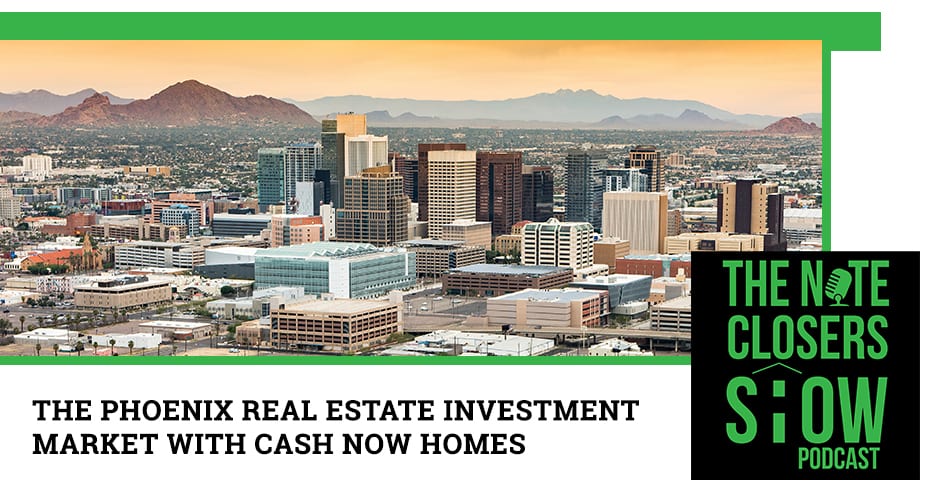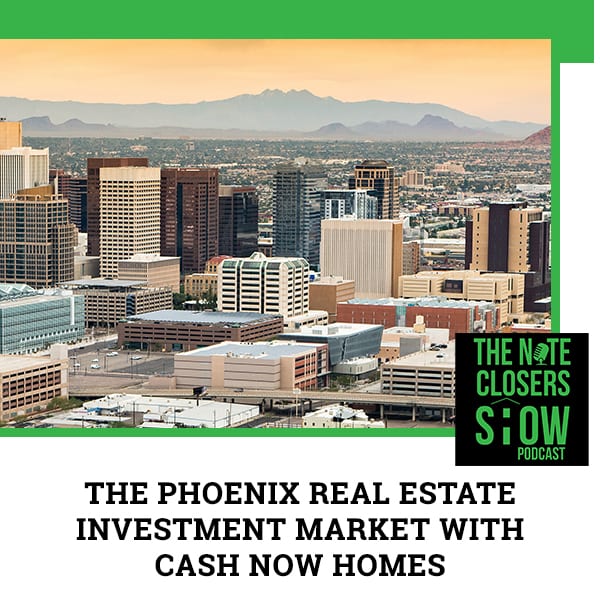
Phoenix real estate never runs out of properties up for grabs. In getting the best deals, talking to the right people can bring you the real deal. Today, Scott talks with Mark Andersen, George Aplicano, and Alberto Ceja from Cash Now Homes and the Money Making Money Podcast to talk about the real estate investment market in Phoenix, Arizona. They discuss market trends, timing, foreclosures, price points, and what’s working for this team. They also share best tips and practices for their community of real estate investors investing in the Phoenix market. Eyeing for a property in Phoenix? Cash Now Homes can surely help you get that dream deal!
—
Watch the episode here
Listen to the podcast here
The Phoenix Real Estate Investment Market With Cash Now Homes
We continue our Market Series with some of the hotter markets across the country. We’re doing a deep dive into what’s going on in the zip codes in the neck of the woods that many of you guys are either living in or looking to invest in. I want to thank everybody in the Note Nation for subscribing and sharing the show. We turn our attention to a market that years ago was a ground zero central for a lot of the foreclosure markets in 2010. I originally started investing in this market back then when 14,000 REOs were waiting to roll out in the market. That’s a crazy aspect of things. The market has rebounded strongly and doing well.
It is one of the hotter markets in the last couple of years. I am excited to reach out to these three crazy cats who are doing an amazing job and doing great stuff wholesale and investing in their market. They’re also providing great content on their podcast. They’re the hosts of the Cash Now Homes’ Money Making Money Podcast. These three guys have a ton of experience in what they’re doing in the market. I’m honored to have the men, the myths, the legends of the Phoenix market, George Aplicano, Alberto Ceja, and Mark Andersen. What’s going on?
We’re doing good.
You are doing a great job. How did you guys get started? Let’s start with that before we dive into the numbers and some of the things that we see up there. How did you dive into besides being a real estate investor?
I was in the lending industry since before the crash. After the crash, I was still in the lending industry. I worked for some of the big banks. After a while, I got a little tired of that. I said, “Let me look into the wholesaling aspect of the real estate part.” When I started doing that, I said, “If I want to be doing real estate, I might as well have another avenue.” I also got my real estate license several years ago. I jumped into it and started doing a lot of the retail part of the real estate. That’s when I met up with George. I’ve known George from the lending industry.
George, I’m sorry to hear that.
Do you want to know the sad part? I was there for twenty years. I was a veteran in the mortgage industry. I was a loan officer. At that time, what happened was I was still living paycheck to paycheck. Most people are living paycheck to paycheck or at least 30 days behind on their mortgage. That’s where I was. I realized that no matter how much effort I put into trying to excel in the business that I was in, it wasn’t working. All of a sudden, I’ve read the book, Rich Dad Poor Dad, and my mindset shifted. From there, I found wholesaling. The weird thing about it was when I read the book, I started seeing some of the stuff and some of the strategies that he was performing, lease options, wholesaling and investing. I was doing the mortgages for those investors who hang them off and I never realized it until after I read that book. Once that happened, it clicked and then I was like, “I can do this. I can be the guy on the other side of the table.” I got into that and started reading up. I got my degree in YouTube University and I met up with Albert and it’s been a blessing since.
Mark, how did you get started?
I’ve been in the mortgage for fifteen years. I moved here to Arizona and jumped right in at one of the bigger banks. I stayed there for a while. I met Albert while I was at one of the bigger banks. We’ve been friends for years. He started venturing off doing his own thing. I stayed in the mortgage industry for a few years longer and then I realized I couldn’t do it anymore. I had that mindset that I am not living my life here at the desk. I quit my job and joined Albert and George. Within days of joining, they gave me a lead for wholesaling. I gave them a call and sold that person a house. It was crazy. Everything put together. It was a huge learning experience and I’ve been trying to maintain that since.
We came from the lending side where you’ve got to check every box, cross every T and dot every I. Wholesaling and some of the other services, you’d be like, “I could do that?”
It is such a relieving way. “I only need two papers. Are you kidding me?”
“You’re not going to look at my credit score?”
“You’re going to lend me money without anything?”
You’ve seen some trends 15 to 20 years between. You have an old man retirement wisdom between the three of you. The Phoenix market have gone through some ups and downs. It’s been a bit of a yo-yo a few years back, but it rebounds back. Where is the market? One of the big things that when I saw you were moving some wholesale deals that had $150,000 to $200,000 in equity, I was like, “We’ve got to talk.” What’s the market looking like? Are you still getting a lot of California investors? Are you seeing more inventory sitting in deals that are popping up that way?
Retail wise, nothing is staying on the market.
It’s insane. The properties there are going quick within days. The wholesale part is a little different.
The spreads are getting thinner. That’s what it is. We had the discussion that we have to start changing our strategies. On a traditional wholesale deal, we used to be able to net 20% to 40% on here and it’s not happening anymore. With them being licensed, we were given the option in regards to listing it. Some people are still not seeing it. A lot of our competitors are overpricing their properties. We’re thinking about doing some hoteling. If the property acquired it in a contract, clean it out a little bit, put it on the MLS and we’ll see how that goes. This is something that we barely started going into because the spreads are not there and the inventory is not lasting long on the MLS.
A lot of the spreads that we are getting here is what we’re also doing in our own flips. We’ve done multifamilies.
Are we talking about duplexes and apartments?
No, duplexes and small multifamilies. That’s where we’ve had seen the bigger spreads.
That’s helped us out coming from the lending background. We understand some of the numbers. We understand that times four units, we’re going to net X based off of that and understanding the cap rate and our cash-on-cash return based off of everything.
That’s what helped us a lot, the multifamily.
Days on the market are small, less than 30 days or less than three months of inventory on the MLS?
Yes.
Are you seeing an increase coming off the side? Are you seeing some of the higher-priced markets? I know you’re probably seeing stuff that first-time home buyer $0 to $300,000 is moving real buck. Are you seeing stuff that’s in the higher range? Is the $500,000 higher starting to lag a little bit?
Inside the big investment community that we have, a lot of our investors are moving. The average sales price of a home right here is about $275,000. Before, they were avoiding properties anywhere between the $400,000 to $500,000 range. Since the spreads are narrowing and a lot of the inventories are gone, especially for that $300,000 price range and below, a lot of the investors are starting to move to that market where it’s a $400,000 to $500,000 range. They’re trying to make those flips happen in the middle in less than $1 million range.
They’re up in the game because there’s an inventory there, but we all know it’s a different type of rehab.
It is a different type of rehab. It is a different type of retail as well too. You don’t have your regulars. The first time home buyer is buying a $400,000 to $500,000 home. It’s different.
With your investors, are you seeing more short sales hit the MLS in some other parts of the country or is it small?
It’s still pretty small. I only see 1 or 2 maybe, but I haven’t seen that many. Those are going quick too when you do see one.
The trend that I see on the MLS though is properties that need a little TLC. It’s good structurally bones-wise, but it’s the hotel.
We see in different parts of the country. We don’t see much here in Austin. Do you guys get an influx of those crazy California investors coming over there? They go for $500,000 and they can buy four places to sell their shack.
A lot of times they come in here. We are selling a property. We sold a property and they moved here, like, “Are you going to get a big house over here then?”

Phoenix Real Estate: Double rehab is a different type of a retail.
They buy all cash. That throws a lot of other borrowers out of the market.
You have access to many things, which is awesome. I can sit here, pick your brain all day on stuff, but we won’t do that for them. In the mortgage industry, one of the biggest things that we saw years ago was a lot of the pick-a-pays, the option ARM popping up, partial interest payment and then you’re re-amortizing the deferred interest. Have you seen a comeback at that point? We know that ARMs have been back for a while, but are you seeing any of those popping up by any chance?
I still have my mortgage license, but the answer is no. I haven’t seen any pick-a-pays. Not that many, but I’ve seen a decrease in regards to FICO score requirements. Before, it was a 660 to 680 FICO score for a 5% down or something like that. They’ve brought it down to 640. There are a couple of lenders at 600 that are willing to lend out almost 100% of the property. There’s not much of a requirement other than that. If you have a job and you have bad credit, they’ll lend it to you. Those are the things that I’ve seen and some very unique products. For self-employment, where they use the 12 or 24-month bank statements, those are the unique ones where I’ve seen they’ll do some interest-only or they’ll do a five-year ARM or something like that.
There is no negative amortization yet.
Wall Street is thinking about it though.
We are not doing those. There’s going to be a correction, but if we avoid the negative ARMs and all that, those subprime ones, I think we won’t have a big of a bubble as we did it in 2008.
The big thing back then, everybody was like, “My value is going to constantly keep going up. It’s never going to be 125% LTV.” You’ve got this similar market price range that we have, but are you seeing people moving more to the outskirts of Phoenix and some of the outline areas and investing in those neck of the woods and they don’t mind waiting 30 to 40 minutes in traffic?
I don’t know so much about investing. I know retail, more bang for your buck, you get that in the outskirts. I do see a lot of retail doing that.
Here in Phoenix, it’s funny the way that the market is that we don’t move up. We moved sideways. We don’t build up higher. We don’t build these big skyscrapers. We don’t have these huge condominiums or anything like that. We keep on going outwards. Before, from the Central Phoenix, it used to be a 30 to 35-minute drive. Now, we’re looking at 45 minutes to an hour from end to end. The outskirts are being bought up, but it’s primary residences that are being acquired. We’re getting an influx of people moving here. They said that 1 in 3 people that move here are from California. A third of our population is from California moving here every single year.
We’ve got to give big love to our Californian readers. You get a lot of influx of people moving there for the warm climate. Have you seen an increase in probate leads or properties? I know you guys have a lot of probably elder care facilities popping up all left and right.
There’s a huge niche for assisted living. We have a ton of investors that are constantly looking for inventory, even homes that don’t fit the criteria that can be built to fit. The unfortunate part of the market is that this area is not built for that, but the demand is here. Nowadays, a lot of our counterparts are looking for land to try to build these assisted living here because they can, buy the land, build a building a lot cheaper than remodeling a property. When I moved from California to here, I had no issues with my joint. All of a sudden, nothing hurt. There was something about Arizona, the sun out here is relaxing. It’s a nice place to be.
Without giving away any of your trade secrets with you finding your deals, what investor activities are you seeing either working for you or your network of investors? Are you still seeing a lot of door-knocking, yellow cards, postcards, yellow letters or bandit signs? What are you seeing having the best bang for the buck these days?
I think the virtual assistant is a big thing here in Arizona. Hiring the virtual assistant in making the cold calls and skip tracing. I know some big-time investors are doing still the mailers, but for us, a big part is the virtual assistants.
Would you mind going into a little bit more detailed about that?
What we do is we get a list of data. For example, we want probates. We’ll go ahead and pull in. We’ll start to dissect the list. We’ll look for high equity or violation codes. From there, we’ll gather a list and then ended up putting it into a dialer system. That dialer system, we have a virtual assistant. The virtual assistant will go ahead and dial to try to see if there’s any interest in it. From there, if there’s an interested seller, then we get that warm interested seller. It goes into our CRM, we start following up with phone calls and then we build relationships. Usually, when we build a relationship, we don’t come at it like, “Sell us your home,” or anything like that.
We come from a consultation standpoint. “Let’s build some rapport. Let’s build some trust. What’s your pain point? How can we solve that problem? No matter what, whether it benefits us or not, we’ll give them the best option that fits their needs. Usually, 9 out of 10, it ends up coming back to us. We end up with whatever we have to do at our end, wholesale and take it down, fix and flip it, retail, whatever that funnel is. With the three of us, we have many different options and channels that we have a solution to their problem.
That’s a unique competitive advantage that you have over most people being investors. In the worst case, you list a property and make a commission.
It is for the benefit of the seller. You go into a house and it’s a beautiful home. Let’s call it under five years old. They want to sell it with the appreciation that that’s in this market. You’re doing them a disservice if you’re saying, “I’ll buy it at $0.60 on the dollar.” It’s something that doesn’t fit their needs. Once again, the best option may be looking at it and listing it. Even in this market, we’ll even throw the option. We do Airbnb and VRBO on this property because of the location that you’re here, make some money. Most people are reluctant to do that. We’ll give them those options. At least we know we did everything on our end to give them all of the information that they have so that they can make an educated decision.
It’s getting a lot harder for us to say it for the opportunity to say, “No, we can’t help you.”
I love it because we always have a solution for them.
You should be all of the solution doctors, “We’ve got a solution for housing ails.” You guys brought up a very critical point there. We see this in a lot of different parts of the country where investors are going to that short-term rental model, the Airbnb and VRBO model. You’re not seeing any kickback by the city or any of the other hotel chains with that trying to fight that in different areas? Here in Austin, they’ve out ruled that in Travis County. You can’t do an Airbnb. You’ve got to be outside of the city limits and do that, which is a big pain.
We haven’t seen that here. The most that we’ve seen here is maybe an HOA Association saying that your lease has to be a minimum of twelve months. It’s hard for them to go in there and say, “We’ve only seen these people for two weeks.” I think that’s the biggest hurdle. In reality, it’s not a hurdle because people are still doing it.
To get around that for an HOA, we’ll take out your property and we’ll do a long-term lease, 24 months against us and then we Airbnb it. We’re the owners but there’s a sublease under that.
That’s a nice lease option. Are you seeing lease options taking place in some cases? I think we’d highlight that with stuff like that. People coming in and doing that aspect of things and putting a down payment and having a percentage of their lease going towards their purchase price.
Not necessarily, rates are low these days. People are qualifying or they’re qualifying the market. It’s been years since the market crashed. All of the people that had foreclosures, BKs, modifications, all that stuff has gone off of their credit reports. We haven’t seen many lease options because of that. Our foreclosure inventory is small here. Also, our general inventory is very small, so nothing is staying on the shelves. All inventory is going off. The benefit and advantage that we have versus anyone else is that since we’re going direct to seller, there’s our competitive edge. We have all of these tools available to us. That’s the one thing that sticks out from everyone else. We’re able to call the seller, get the relationship, and figure some of their problems. Be the solution doctors.
I think we’re more like doing the lease options and stuff that we are trying to get into ourselves.
There are wholesalers though in our market that that’s all they specialize. It’s not a lot.
It’s minimal that people are doing that.
You guys are putting a community there together with investors. Did you ever get anybody upset that you were able to make a solution happen for the borrower and they weren’t able to? Have you ever seen any of that flashback?
The funny thing about that is that we have a unique community here. We’ve all done business together. A lot of the wholesalers and investors here, I’ve done business with all of them. The funny thing is that there have been deals where I’m like, “I can’t do this one. I can’t figure out how else we can solve it.” There was a guy under foreclosure who had a little equity at $25,000. It was in a $55,000 plus community. We got on the phone with four different investors to try to figure out a way to do it. We were going to do a wrap around it. At the end of the day, the numbers didn’t make sense because all of a sudden, he was underwater that it did pay off the late fees plus the late payments and everything else to reinstate the loan, it was going to be too much. We ended up giving him the option for even a short sale. That was the only option that we could do. We collaborated throughout the entire investment community and we came up with these different solutions to try to help him. It was him that did it. You can’t blame us on it.
We do have a good community here of wholesalers and investors. There is a lot of collaboration here. That’s a great thing here because no matter what the thing is that when we get a deal and we don’t know what to do with, the community that we have, we can easily take it to them without us thinking, “They’re going to take it from us.” They are like, “Let’s see what we can do to help you guys out with this.”
That goes back to the mindset. We’re not of a scarcity mindset. We’re an abundance mindset and so are they. The wavelength comes back and it’s like, “We’re not taking anything away from you so that we can all get to a better place.” One of my peers was signing documents over there. He looked at the assignment fee and he’s like, “$60,000 assignment fee. That’s awesome. I’m glad that he made that money.” A couple of my partners, the properties that we bought off of a separate wholesale, they made their $20,000 on it and we were like, “Keep going. Send me more. We’ll buy more.” It’s that mindset. The mindset has to be the abundance mindset and within our peer group and where we’re at, it’s one of those things that we’re blessed. Not all markets are like that. We’ve heard some of the horror stories. The reality is, there’s an abundance of deals. If you get the right people around you, it’s going to be a matter of time before you explode.
Arizona has always had a big investor market, which is great. It’s always good to hear that it’s a cohesive or coopetition. People are competitive but working together to make things happen. You can’t have that one. Are you guys doing anything in the commercial markets? Are you seeing any changes in the commercial space as we talked about long-term care and that stuff happening? Are you seeing anything else in that neck of the woods?

Phoenix Real Estate: When building relationships, come from a consultation standpoint to build rapport and trust.
I have a couple of developers that are looking into long-term leases for commercial buildings. That’s where it’s at. We’ve been seeing a little bit more of the commercial. The reality of it is that that is such a location-based business in certain areas of Phoenix. Some are better than others. Traffic is going to dictate what is going to be an actual good location versus one that’s not. We’ve been seeing them, but it’s not as dense as the regular single-family residence.
Was it 90 days of foreclosure in Arizona or is it 30 days? What’s the foreclosure time frame in Arizona?
I believe it is 90 days.
It’s still relatively quickly. You do not see that many foreclosures. Here in Texas, we foreclose on the first Tuesday of the month. Is it once a week or how often is the foreclosure auction?
It is once a week. Everything that we have here in regards to the data that we have available, everything is online. We don’t have to go to the courthouse to get anything that we need. It’s already available to us online. Since it’s already public information, what happens is that the competition is already all over it. There’s a foreclosure on there. There are 60 or 90 days. For example, you get lists from a TransUnion or Equifax. If they are 60 to 90-day late on that, we’re already jumping on that. We’re already calling them. They’ve already been called for the last 4 to 5 months where they’ve been keeping that rolling 60. We’re already on top of that. Chances are by the time that they get to that point where, “It is going to foreclose,” they give us a call and say, “I’ll sell you the house.” We are like, “No problem. Here you go, here’s cash.”
Don’t you love that? They could have called you 60 days ago.
We’ve been telling them. We’ve been posting our face on Facebook and Instagram like, “Sell us the house.”
You still do see a lot of banks doing extensions on the auctions.
I think that’s everywhere. People have come up, they’re either filing BK to delay it, doing a TRO or some temporary restraining order, or trying to find a solution and the banks extended it for a little while. We’ve done that with where we will suspend the foreclosure on a note deal because they’re in a trial payment period. If they miss a month, then we can always kick it back and get rocking and back. Everybody’s favorite asset is apartments these days. Are you seeing a big influx of that? How’s your multifamily market when we’re talking apartments?
To get apartments here, it is very expensive. What we’re starting to do and starting to look at is outside the Phoenix market.
Do you mean other smaller areas in Arizona or outside the state altogether?
Outside of the state altogether.
We started diving into those constant markets, Southeastern Wisconsin.
I love Green Bay. One thing about Milwaukee, Wisconsin, is that property taxes are high up there.
That was the first thing that we noticed when we bought our first home.
We’re going to fight those taxes every year. How long is the tax foreclosure in Wisconsin? We talked about a lot of influx from California and probably getting Southern and Northern California people coming in and trying to keep up with affordability. It’s still an affordable market compared to everything in your next-door neighbor up there. If you guys could look at a crystal ball and I know that’s a big deal for all of us because that was a case we’d be in Vegas, where do you think things are going to go? I asked this because you have such a different background and you’ve got a great mix of being a realtor and mortgage broker and understand the investor market. Where do you think the market’s going to go for Phoenix here in the next 24 to 36 months?
There’s going to be a correction here pretty soon within that time frame. I don’t think it’s going to be like it was back in 2008. We don’t have all those negative programs you get into not paying anything. I don’t think it’s going to be that big.
A lot of our peers, including us as well, we’re going to be sitting on cash. There’s a reason for that. We expect that the market is going to do a correction. It doesn’t mean that we’re not buying. We haven’t stopped buying. It’s a matter of we’re being a little more careful in regards to what we purchased and how we purchase it. We’re doing more due diligence on it to make sure that it’s the right property that fits what we need on it. Is there a correction going to come? Yes, but we don’t know when. A lot of people say, “Trump is still in office and if he’s going to continue, things that are going to continue.” A lot of people say the opposite. The answer is, I don’t know. The only thing we can do is protect what we can and whatever is in our ability. Control what we can control. We’ll do a little more due diligence on what we buy, be careful about what we buy and sit in a little more attached so when the properties come back and they’re cheaper.
Mark, do you want to add anything to that?
These guys will think I’m insane, but I don’t think it’s going to be as soon as 24 to 36 months with the correction. We’ll see a down taking interest rates on mortgages to make things a little bit more affordable. The UK is already giving tenure notes at 0% interest. I think that the direction we’re going to head is the same way.
I love that international monetary policy guy there.
That’s why all three of us get along.
You can agree to disagree. The thing I always like to ask, where do you think the markets are? You guys talked about diving outside of other markets, looking at different things. What made you choose the Wisconsin market? What made you look at that aspect compared to others?
We’ve got boots on the ground. We’ve got a realtor. We’ve got everything over there. Mark is a local.
I grew up in the Wisconsin area that we’re trying to invest in. I know some of the areas are a little bit more detailed than if we picked one off of a dartboard.
The main thing that we’re doing in that area is mainly for cashflow, buy and hold.
That was my thing. It was the numbers. I was like, “We can buy a property at $60,000 and then all of a sudden rent it at $1,120 every single month.” We’ve come up with our goals collaboratively to have financial freedom. At the end of the day, I want to travel a bunch and I don’t want to have to worry about where our next paycheck is coming. That was the initiative to go ahead and go out there and let’s start cashflowing on these properties. You look at those numbers, even if the taxes are high out, we could still make it work. There are all kinds of different strategies that you can use, but in general, that number of your rate of return is insane.
The Capris are good.
Speaking of rent rates there, is there a rent rate number in Phoenix that is a sign either a rough area? I’ll give you an example, like Columbus, Michigan, anything below $500 is a two-gun alley.
We are living in the Wild, Wild West.
The rents here are getting pretty insane as well.
Since we don’t go up and we go out, a lot of the areas that were two gun alleys or two gun properties. They’ve been gentrified. They’re starting or if not, they’re being bought up because there’s no more market. If you start going to the outskirts, the outskirts are being built. Those are all new builds. Our market is a little unique. There’s not a lot of inventory so everybody is scooping it up and fixing it up.
Is there a monthly rent number?

Phoenix Real Estate: There is always an abundance of deals. You just need to have the right people around you.
If it is a two-bedroom, it’s under a thousand dollars. Steer away from it.
What’s the best way for people to tap into you? You are building a community. There have been a lot, but do you have your own community meetup and stuff like that?
We have a monthly meetup with a local place. The podcasts that we have, we bring on special guests and we do all those things to try to connect with our investor community out here and help out and give back.
That was the cue for you to tell me the website where people got more information.
CNHPhoenix.com is our actual website for Cash Now Homes. You can find us on Facebook, Instagram, everywhere else at Money Making Money Podcast.
I appreciate taking time on your busy schedule. Mark, thanks for setting us all up. It’s amazing what will happen when you start following people on Instagram and real estate and then checking out. It goes to show that you’re one connection away from expanding your knowledge in a market. Do you mind if our readers reach out to you? I’m sure you guys don’t, whether they’re buying, selling or looking for more to do.
Questions or anything, we always are answering back on our Instagram, Facebook, all of our socials. By all means, reach out and we’d be happy to help out.
You have a couple of pretty sweet wholesale deals on your website. I noticed too. Do you have a nice little spread there for everybody?
Hit us up.
Thank you so much, guys. I appreciate your coming to the Note Closers Show. Note Nation, you learned it from these wildcatters doing some great stuff in the Phoenix market. The market is doing strong as they say. It’s growing out a lot of opportunities. You’ve got to know where to look at. That’s what’s great about having a great investor community in a local market to help avoid you making a dud, and then helping you find a deal. Take a look at them and check out their podcast as well. Check out their website. Go out and take some action and we’ll see you all at the top.
Important Links:
- Money Making Money Podcast
- Rich Dad Poor Dad
- CNHPhoenix.com
- Facebook – Cash Now Homes
- Instagram – Cash Now Homes
About Dr. Mark Andersen
 Mark, George and Alberto have over thirty years of combined experience in the real estate and mortgage industry and they interview the top investors, realtors, and mortgage professionals in and around the Phoenix market to share best tips and practices for their community of real estate investors investing in the Phoenix market.
Mark, George and Alberto have over thirty years of combined experience in the real estate and mortgage industry and they interview the top investors, realtors, and mortgage professionals in and around the Phoenix market to share best tips and practices for their community of real estate investors investing in the Phoenix market.
Love the show? Subscribe, rate, review, and share!

